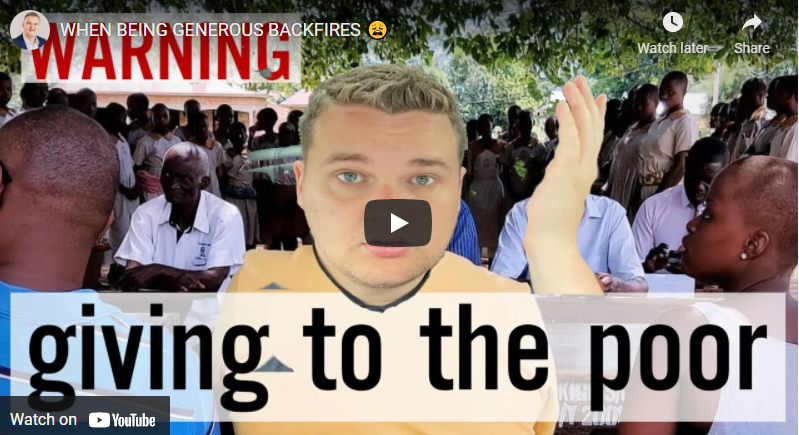When Being Generous Backfires…,..
Hello everyone! I am Samuel Leeds, a property guide from the UK. It will not be wrong to admit that you are one of the few privileged people in the world if you are going through this read. There are so many elements in our daily life that are overlooked by us every day, and if evaluated closely, these elements are nothing but privileges. From access to clean drinking water to a roof over our heads, everything is a privilege.
As individuals with so many advantages and little to no hurdles in our lives, it becomes a moral responsibility that we give back to the global community by supporting those who are less fortunate than us. Today, we are going to focus on a few basic questions. The question that arises is, who do we help? And how do we help? These are two essential questions that one must ask themselves before being generous, because at times, no matter how good your intentions are, being generous can backfire on you.
How to be Charitable?
I would like to educate our readers on how to be charitable in a manner that benefits the communities in the long run and to help identify the consequences of not donating intelligently. One of the most common improper practices that we see and ignore is when people raise funds through donations in a manner that is similar to that of begging.
The idea of raising funds is not to beg, and it is to do something yourself that you will know will benefit the community in the long run. It is your ethical obligation to donate to those individuals or communities that require financial or any other type of aid regarding the wealthy individuals. While it is important to donate, it is also essential to be intelligent when being charitable. The idea of charity should enable the affected community to become self-sufficient not to need any further aid from foreign countries.
Donations and charities should jump-start the community and pave their way to become a better version of themselves. Continuous and improper allocation of funds only cripples the unprivileged communities even more.
How Can There Be A Generous Backfire?
At times, despite the best intentions, the result of our actions is quite the opposite of what we hoped. And this is precisely what happens with acts of charity most of the time. To explain this phenomenon, let us use an Italian proverb as an example.
“Give a man a fish, and you feed him for a day. Then, teach him how to fish, and you feed him for his lifetime.”
The proverb argues that it is better to teach a person how to hunt a fish than to feed the person once. The idea behind it is to make the person self-sufficient, skilled, and independent. This is precisely what the aims of the charities and donations should be. And this is the function that grants and funds rarely fulfill.
It is critical to think about the long-term effects donations and aids will have on the undeveloped economies. We will use a couple of examples to evaluate how gifts can backfire in the long term. Let’s take Africa for instance; when wealthy individuals see the poverty levels in regions where people are living even below the absolute poverty line and seeking shelter on the streets, they may start funding an orphanage in the hopes that children will have access to water, food, clothing, and shelter. As a result, the parents will also have fewer mouths to feed. The problem that arises is that once the child turns 16 years old, they have to leave the orphanage as they are now an adult in the eyes of the law. Since these individuals have not been a part of society for so long.
As a result, they cannot adjust to the new environment and are alienated from society. At this point, these individuals do not have the skills needed to enter the workforce to meet their needs and do not have parents to whom they can return. As a consequence, these people end up on the streets again for the rest of their lives.
The second example is also from Africa. It is common in Africa that there are mosquitos everywhere; several reasons are responsible for this. First, while visiting the region, a wealthy individual observed that the mosquitos were a source of discomfort for the locals. As a result, he donated a considerable quantity of mosquito nets to the locals. This sounds very generous. The consequences in the following year, however, were not pleasing.
It should be noted that mosquito nets are not durable and need to be replaced within a few months. Due to the donations of mosquito nets, local businesses that manufactured the above-said nets saw a fall in demand and, as a result, we’re forced to shut down. The consequence was that an increase in the unemployment levels and the local production levels fell dramatically. In the following year, when there was a demand for mosquito nets, none were available as the producers were forced out of business due to the donations.
It should also be taken into account that Africa is often generalized by the Western media that there are high poverty rates throughout the African continent (which is not the truth). The African people need the help of the West to save them. Due to this sense of white-washing, the tourism industry in Africa has seen a decrease, affecting the African economy in the long run. The West degrades Africa.
Lastly, an example can also be taken from our daily lives; at times, we see people offering a good amount of money to beggars living on the street in an attempt to get them through a few days comfortably. However, studies indicate that such individuals are more likely to spend that money buying drugs than purchasing food or clothes.
How To Avoid Backfires?
There is no one answer to solve this problem. Several different situations require different responses as well. Here are a few suggestions to prevent backfires.
Firstly, as an individual or as a humanitarian organization, NGOs mustn’t be paid any funds without transparency about where the funds are being allocated. At times, the funds are used by the NGO officials for their self-interest rather than for the improvement of the affected stakeholders. This is also a problem if the funds are given to the government. Hence, transparency and clarity must be demanded while evaluating whether the lives of the affected individuals are moving towards improvement or if any corrective actions need to be taken.
Secondly, it is better to get in touch with a tribal or local leader who is popular among the locals to get an accurate insight into their problems and then use the funds to solve or eliminate those problems. While doing this, it is also important to research with an open mind regarding the issues that exist in the region. As a result, it is also possible that the root cause of the problem might be discovered and may also get solved.
Wrap Up!
All in all, it is best to use your donations to finance local businesses to grow and expand their operations span, which will create a multiplier effect and improve the economy’s overall performance. This will be fruitful for the region in the long run and will benefit future generations as well. Remember, give generously but intelligently. Don’t forget to subscribe to my Youtube channel! See you!
Our Charity: Samuel Leeds Foundation https://www.samuelleedsfoundation.org/
Also this podcast is now available to listen to on the go on iTunes, Spotify and Audioboom.
❓ Have a question for Samuel and Amanda? Comment below and they will answer it in next week's video.
🗣️FOLLOW US ON SOCIAL MEDIA:
Samuel Instagram: https://www.instagram.com/samuelleeds…
Amanda Instagram: https://www.instagram.com/amandatleeds/





